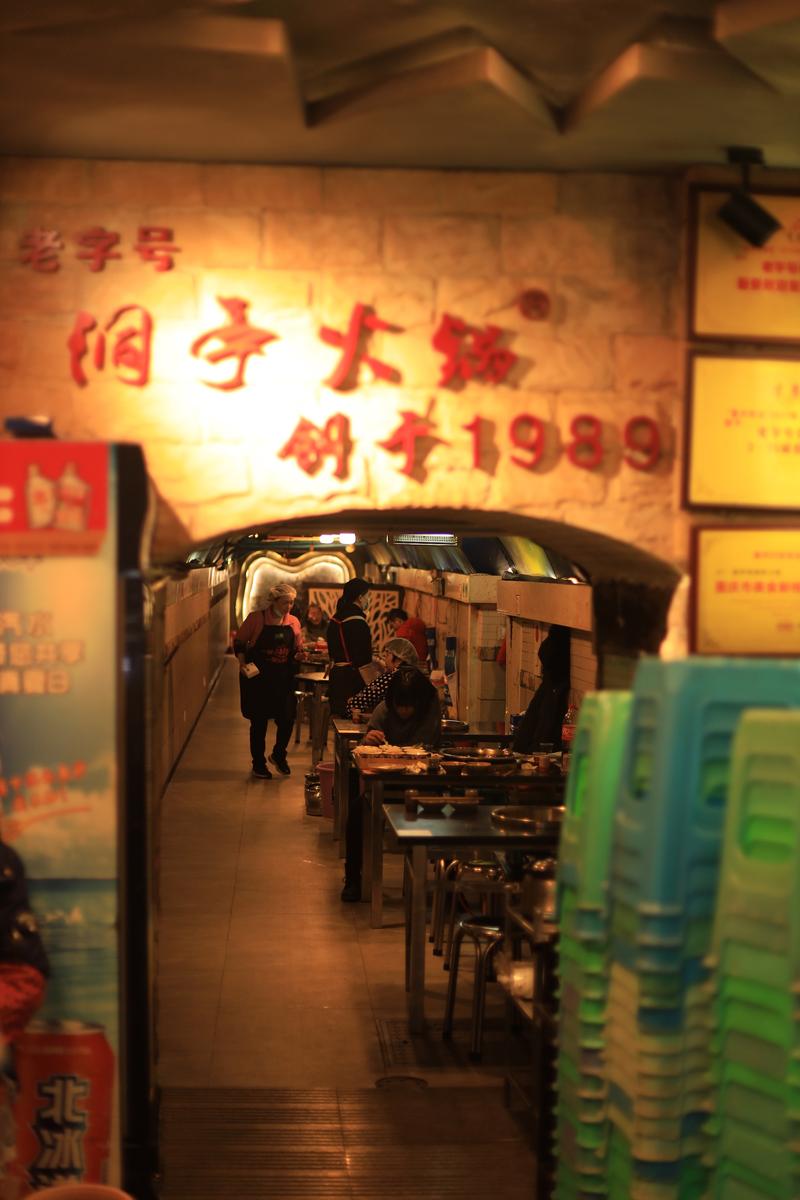February 10, 2022
CHONGQING – When Chongqing Hotpot, a Chinese comedy film released in 2016, became a blockbuster, it drew attention to a less noticed part of the cosmopolitan city-a former bomb shelter used as the film’s primary filming location. It was just one of many sites originally built as shelters from air raids like the Bombardment of Chongqing, which was carried out by Japanese forces from February 1938 to August 1943 during World War II. Today, the facilities serve as shelters of a different sort-not for people, but for businesses.
In the film, the hotpot restaurant is located in one such shelter. That might seem surreal but there are shelters in the city being used in that exact capacity today. According to the Chongqing Civil Air Defense Office, more than 200 shelters have been rented out for other uses, including as gas stations, restaurants, wine cellars, museums and book stores.
Wang Chengjie, who works in the office’s regulations, publicity and education division, said that most shelters are in the city center, an ideal location for the businesses now housed in them.
Hotpot hot spot
Dongting Hotpot, a popular Chongqing restaurant, has been operating for 32 years out of a bomb shelter on Zhongshansan Road in Yuzhong district.
The H-shaped shelter, with tunnels about 2 meters high and 3 meters wide, is about 185 square meters in size according to 42-year-old Deng Hong, the restaurant’s owner.
He said that although he has two other branches nearby, many customers still line up for hours during peak season to dine at the original.
Red characters reading “Dongting Hotpot, since 1989” hang above the entrance. Beside them, is a mural depicting the Japanese bombardment. Last year, Deng invited a professor from the Sichuan Fine Arts Institute to paint the mural to show how the city’s food and history are linked.
Inside, the walls are clad with striped stones. It feels like a big snug, with 22 tables accommodating over 200 customers. A ventilation system, air conditioners and dehumidifiers help keep conditions inside comfortable.

The restaurant is located in a bomb shelter on Zhongshansan Road in Yuzhong district. (DENG RUI / CHINA DAILY)
Deng took over the business many years ago from his aunt Deng Xiaoning, who first rented the shelter and transformed it into a restaurant in 1986. The rent was relatively low and the structure had previously been used to store pickles after the war. His aunt created the Dongting brand in 1989.
“We never expected the restaurant would be this successful. The flavors and the chef, who is almost 60, are just the same as they were on day one,” Deng Hong said.
“Another upside of the shelter is that it is warm in winter and cool in summer,” he explained, adding that at the peak of summer, the temperature inside is 12 to 14 degrees cooler than outside, without air conditioning. In fact, the air conditioners are also used in the winter to cool the air heated by the many hotpots.
Deng said his customers are split evenly between residents and tourists and are generally between 20 and 40 years old. “Chongqing hotpot is already unique, and having an authentic hotpot restaurant in an actual bomb shelter heightens the experience,” said 22-year-old Huang Fenglai, a tourist from Guangzhou, Guangdong province, who ate at Dongting with a friend on Christmas Eve.
Deng said his family hopes to turn Dongting into a century-old brand. The restaurant is applying for designation as a municipal-level time-honored brand and as an intangible cultural heritage item.
Creating jobs
Statistics from the Chongqing Civil Air Defense Office show that more than 100,000 jobs are created each year by businesses in the bomb shelters.
Besides the economic benefits they bring, the government is working on creating educational projects to help people remember the past, cherish life and improve their awareness of the nation’s defenses.
In September, the air defense tunnel under the Memorial Site of the Bombardment of Chongqing was opened to the public for the first time in 80 years to mark the 100th anniversary of the founding of the Communist Party of China.
The site commemorates the tragedy that occurred on June 5, 1941. As air raid sirens sounded, over 10,000 people tried to cram into a few bomb shelters that only had enough space for half that number, leading to the deaths of more than 2,000 people, who were either crushed or suffocated.
“More than 30,000 people died directly from the air raids, while a further 6,000 were killed or injured as a result of associated events,” said Su Yuankui, a survivor of the tragedy.
Su is now director of the Chongqing Bombing Survivors’ Litigation Group, which was formed in 2004 by 188 survivors and relatives of victims from Chongqing and nearby cities. The group is currently suing Japan for reparations.
Local media reported last year that an elderly woman, who had taken refuge during the bombardment in the shelter that now houses the Dongting when she was young, went to eat at the restaurant.
“My mother has a strong attachment to the shelter,” her son told the media.
The first batch of civil air defense demonstration projects, including the Memorial Site of the Bombardment of Chongqing, the Shibati Tunnel Site Memorial Hall and the Chongqing Civil Air Defense Publicity and Education Center were opened last year, attracting more than 1 million visits.


